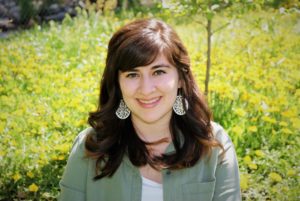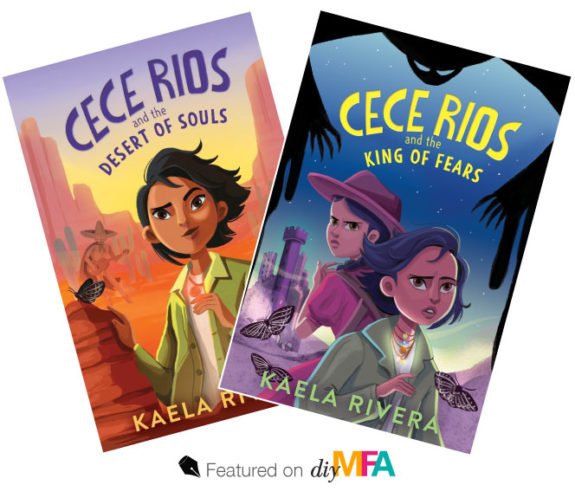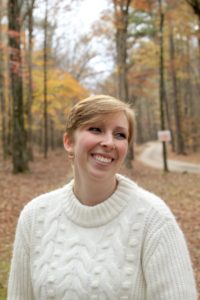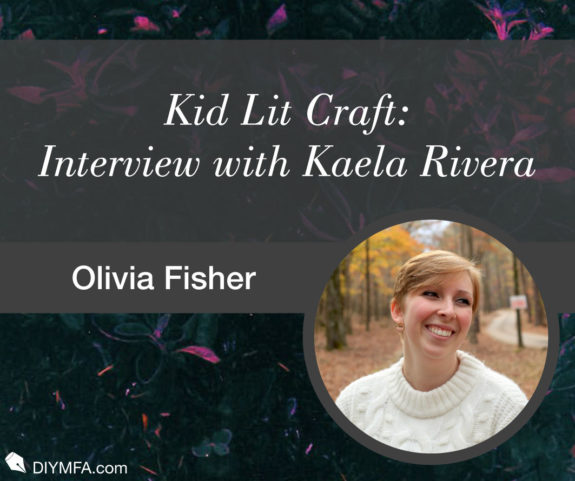Hello fellow kid lit writers! I’m extra excited about this author interview today because I got to interview one of my dear college friends and brilliant author, Kaela Rivera! Kaela has some great writing advice for you all and some valuable insight into the publishing process.
Instagram: @domwritesbooks
Twitter: @domwritesbooks
TikTok: @domwritesbooks
About Kaela Rivera

Kaela Rivera is the award-winning author of the Cece Rios series. She grew up reading the folktales of her Mexican-American and British parents in the forests of Tennessee, but now she writes about them from the soaring mountains of Utah. When she’s not crafting stories, she’s working as a managing editor for a marketing company—or secretly doodling her characters in the margins of her notebook. One of her greatest hopes is to explore the beauty of cultural differences—and how they can bring us all closer. Visit her at kaelarivera.com.
Instagram: @domwritesbooks
Twitter: @domwritesbooks
TikTok: @domwritesbooks
About the Cece Rios Series
Living in the remote town of Tierra del Sol is dangerous—especially in the criatura months, when powerful spirits break free from their home in Devil’s Alley to threaten humankind. But Cecelia Rios has always believed there was more to the criaturas who roamed the desert, much to her family’s disapproval. After all, it’s common knowledge that only brujas—humans who capture and control criaturas—consort with the spirits, and brujeria is a terrible crime.
When her older sister, Juana, is kidnapped by El Sombrerón, a powerful dark criatura, everyone in town believes she’s lost forever. But Cece is determined to bring Juana back. To get into Devil’s Alley, though, she’ll have to become a bruja herself—while hiding her quest from her parents, her town, and the other brujas. Thankfully, the legendary criatura Coyote has a soft spot for humans, and agrees to help her on her journey. With him at her side, Cece sets out to reunite her family—and maybe even change what it means to be a bruja along the way.
Book 2 Cece Rios and the King of Fears will come out on September 27, 2022!

Instagram: @domwritesbooks
Twitter: @domwritesbooks
TikTok: @domwritesbooks
Interview with Kaela Rivera
Olivia Fisher: Kaela, what made you want to write for kids?
Kaela Rivera: I think I’ve always sort of been a kid, even as I got older and more mature, and I’ve always written for myself first. I revise to be understood by other people, but the writing process itself has always been to entertain, heal, and explore with my inner child.
Of course, I adore children, so that’s made me all the more excited and motivated to share stories with them. I used to tell stories to my friends, little sister, and younger kids as I was growing up—I have more than four nephews, so you can probably see how that came into play. And I find myself still writing for that little-me, those little nephews (before they had the audacity to grow up), because in childhood I’ve found we have such a greater willingness to learn, to experience, to understand, and to hope. We start losing that as we get older, but children are ready for adventure. They’re ready to grow. And that’s what I want to explore most in my writing.
OF: How did you develop your writing craft?
KR: I started by writing a lot, reading a lot, and doing both frequently. Where some kids watched TV, I always ended up sitting down to write because I wanted to be on the next leg of whatever adventure I was currently weaving. That gave me the pretty stable foundation I needed as a writer—instincts for pacing, dialogue, structure, character, and even grammar.
I reached a pretty solid intermediate writing level once I’d finished about three/four novels, and that’s when I felt I needed a better level. I was in college at this point, and I could write well by that point, but my voice wasn’t distinct. I’d practiced emulating authors I loved in order to get a feel for their skills. I’d read a lot. I studied books on writing, practiced over and over. But I knew it was time to develop the way I wanted to write.
Markus Zusak, the author of The Book Thief and I Am the Messenger, ended up being key for me in that way. There was an interview he gave where he talked about wanting to write so much like himself that no one could ever doubt it was him. That’s when I went to work. And I should say, that led to some really rough experimenting. I pushed my language, my descriptions, my internal exploration pretty far. Not far from me—I was digging down into myself and pulling up all kinds of stuff from the mines of my mind. Sometimes, when I ran that writing by people, they were totally confused by my descriptions, the blocking, the idea. That was the next step: learning how to polish up the rocks I was digging up from inside myself, so other people could recognize, connect, and understand what I was saying.
Toward the end of my college years, I grew more and more confident in my writing. I submitted novels to agents and editors, and I learned from that that my worldbuilding and plots were still weak points. So, for the first time in my writing practice—I tried to revise. And I should point out that learning to revise is a huge, important part of the writing process that I had completely neglected in favor of moving on to the next project. I don’t recommend this route, but it did mean I avoided over-editing and not finishing projects, at least. Different writers encounter different difficulties, though, so mine became figuring out how to revise—how to get a sense for when something needed to change, when something could be better, what exactly needed to change, and how to make all those changes a cohesive part of your image for the story. And, well, how to change your image of the story to be truer to your actual intentions.
Writing is exploratory, I believe. And revising is about cohesiveness and focus. You need both to create a good book, in my opinion—both exploration and focus. Magic and clarity.
I finally worked out my plot issues with my next project, which became Cece Rios and the Desert of Souls. That was about my tenth book I think, and that was the book that got me my agent. Working with her and my editor really helped me nail down my understanding of revision—but of course, like all writers, I’m still working on it!
OF: Tell us a little about your first book! What was the publishing process like for you?
KR: Cece Rios and the Desert of Souls is my first published book—and it turns out to be the first book in the Cece Rios series! The second book comes out September 27, 2022! So close!
Cece’s publishing journey was an interesting one. I actually had an R&R on a previous book out with my current agent, who was then not yet my agent, while I was finishing Cece. I submitted Cece’s first draft to PitchWars (R.I.P.), and when all the feedback came back as “I can’t help you make this better; it’s already complete besides adjusting this one scene”—a response I’d never gotten before—I had a feeling it would be the one to get published.
It turned out I was right! Just a month or so later, I submitted Cece (with that one scene adjusted) to the PitchAmerica contest (also R.I.P.). I was pretty good at contests, since I have a decent knack for pitching and marketing, so I thought I’d try it out. I got into the agent showcase, and my not-yet agent, Serene Hakim, saw Cece’s pitch and opening chapters. She already had my R&R as I mentioned, and she loved what she saw in Cece. She made an offer, along with two other agents, and I went with Serene because her editing resonated with me, and she felt both approachable and capable.
After Serene and I signed our contracts and officially started working together, we went through revisions and then went out on submission. After that, my editor at HarperChildren’s reached back out to us, and we were off on our publishing adventure!
OF: Did that process change after you published your first book?
KR: Publishing feels very different since Cece Rios and the Desert of Souls launched. For one, I’ve learned that what people say about publishing timelines is true: there are two speeds, 1) forever waiting and 2) go, go, go everything’s happening now! I’ve had to learn how to revise faster and better, how to clean up my process, and how to make my writing a bit more consistent—all while balancing online presence, in-person appearances, and behind-the-scenes writing and deals for future books.
So, publishing after my first book has been stressful, but it’s also been exciting and fun. I really enjoy the variety and constant set of new opportunities and new learnings that come with publishing, even if challenges come alongside them.
OF: What’s the hardest thing about writing a book?
KR: Revision still feels like the hardest part of writing for me. It’s the beautiful, painful, wonderful, terrible process of slowly and precisely going through your book from high to low levels and bringing it together. It’s what turns a good book into a great book, and a nice experience into a fully moving, satisfying one. I should know, as I’m a managing editor in my day job. I have over eight years’ experience editing other peoples’ work (think copywriting, though—not the creative side). And yet, revision is also the part where I doubt myself, question everything, and balance the needs of what I want the story to be and how the story can be accessed by others.
Revision is absolutely worth it and oh-so important. But it’s difficult for me. Of course, that’s just another example of how some of the hardest things in life are the most worthwhile.
OF: What’s the best thing about writing a book?
KR: I adore the free, dauntless exploration of the rough draft. If you asked my writers group, they’d tell you I write quickly, and I write a lot. Every book I write requires cutting at least twenty thousand words. But I think that’s because I need to spent time in the world. I need to sit in the quiet moments with my characters, the breath between plot points, and explore the full impact of my character’s internal experiences and thoughts. I need to explore all the many interesting things the plot could conduct, and I need to sit in the world and breathe in its smells and touch its leaves and watch its sunsets. Some people may consider that a lot of wasted words, but that travel experience gives me the backbone, the anchor, the foundation of the story, so I can always go back to those feelings as touchpoints when revision. That’s how I don’t lose the essence of the story (or at least, how I hope I don’t).
In that rough draft period, I work out all of what I want in a book. I teach myself what the characters need, and I explore and ask questions, and I experience the things I need. That’s why that first write-through is so important to me. It’s freeing and exciting and confusing and interesting. Revision, as it comes later, turns all of that into something cohesive. It’s the distilled version of my experience, the one I want to share with others, so that hopefully, the good I got out of it, and what I learned, and the healing I received, might get passed on to anyone who knows or needs it.
OF: What do you hope readers will take away from your books? Or what experience have you had interacting with your young readers?
KR: The biggest thing I want to leave with people is probably hope. Hope in the difficult times, light at the end of the tunnel, healing in and through and after pain and hardship. To me, hope is the only true realism. Pessimism and cynicism I find naïve, since both usually come from disappointed optimism, where, when you were looking for only joy in order to be happy, you found hardship, and decided that joy no longer was. But hope bespeaks light even when darkness surrounds. Hope knows exactly how hard life is and can be, and reaches for the joy and the contentment and recovery and healing that can still be as well. I want to offer that to readers, so they can go on adventures that heal and reaffirm their lives.
OF: What’s next on your author journey?
KR: The third book in the Cece Rios series is next up on the list! I’ll be starting revisions for it within the next month or so. I’m also working on a horror MG book duology—and a secret project I can’t talk about yet. So many exciting things to come!
Thank you for this wonderful interview Kaela! If you want to follow along with Kaela’s writing journey and read her books, visit her at kaelarivera.com.
Tell us in the comments: What were your big takeaways from my interview with Kaela Rivera?

Olivia Fisher is a children’s lit writer and freelance editor with an English degree from BYU-Idaho. When she isn’t dreaming about living in a treehouse or chasing down her two young boys, she enjoys curling up with a book, watching Star Wars, writing her next adventure, and trying to live in the state of child-like wonder that we all secretly, or not so secretly, miss. Follow her adventures on Twitter or Instagram, or hire her for your next editing escapade on Fiverr.







